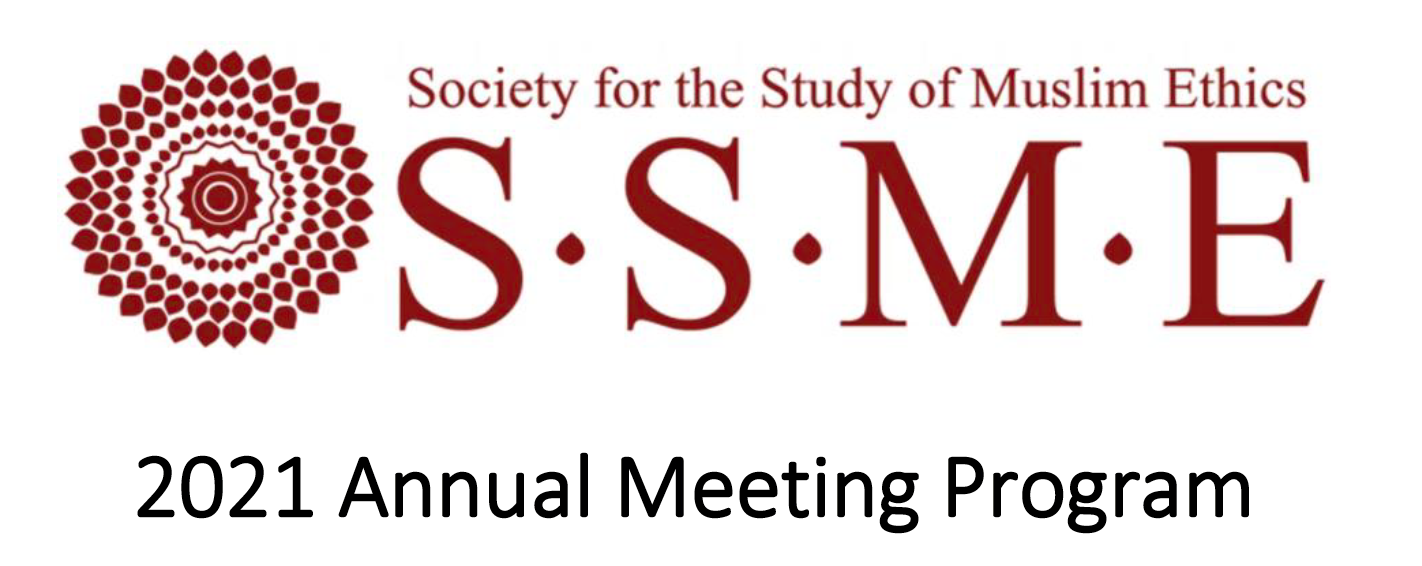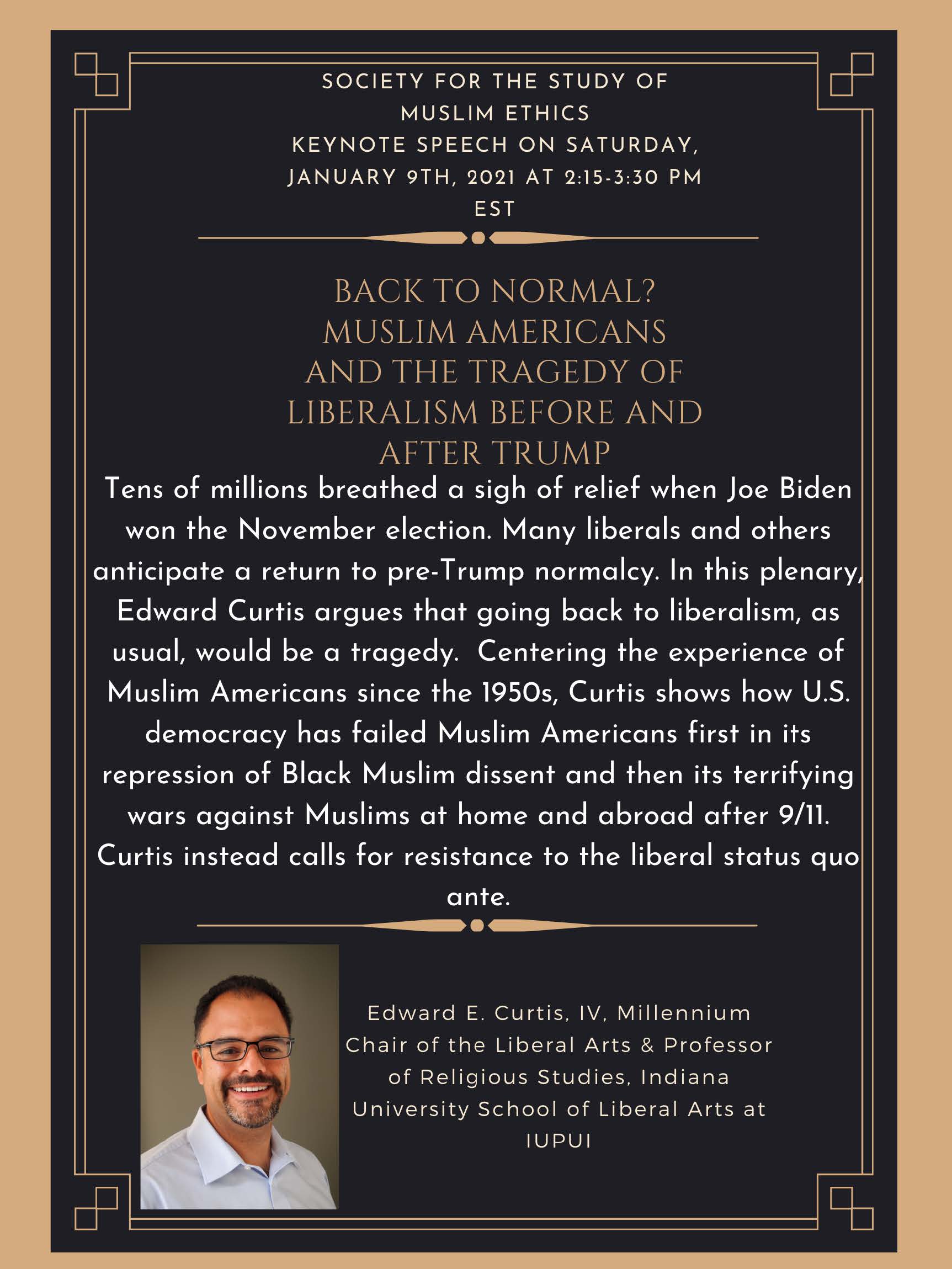
2021 Annual Meeting Program
THURSDAY JANUARY 7
12:30-1:45PM
Ritual and Materiality in Muslim Ethics
Abstract: In this panel, Verena Meyer conceptualizes visiting and praying at graves (ziarah) among traditionalist Muslims in Java as a ritualized memory practice with an agency that is irreducible to cognitive processes of transmission, arguing that the effectiveness of this ritualized memory is contingent on a particular ethic that understands a virtuous relation between the living and the dead as reciprocal. Syeda Beena Butool and Jesse Miller explore the deployment of Qur’anic verses in monuments during the Umayyad and early Abbasid eras and argue that a hermeneutical approach to these monumental inscriptions illuminates the degree to which they may be understood as ethical arguments in favor of power and authority.
Panelists: Verena Meyer, Columbia University
Syeda Beena Butool, Florida State University
Jesse Miller, Florida State University
Convener: Cyrus Zargar, University of Central Florida
2:00-3:15PM
Emerging Perspectives in Religious Ethics
Abstract: Composed of emerging scholars and members across the three sister ethics societies (SCE, SJE, and SSME), this panel analytically and constructively addresses a number of today’s most pressing societal challenges such as the relationship between religion and science as well as how Jewish, Christian, and Muslim ethics might provide resources for resisting the dominating forces of the surveillance state and late capitalism along with white supremacy. Though diverse in their approaches, what unites the panelists is a commitment to interdisciplinarity, the welcoming of theologically thick voices, and the belief that collaboration among religious and theological ethicists is crucial as we seek to address those moral challenges confronting pluralistic societies today.
Panelists: Yonatan Brafman, Jewish Theological Seminary
Niki Kasumi Clements, Rice University
Sam Houston, Stetson University
Ross Moret, Florida State University
Bharat Ranganathan, Case Western Reserve University
Convener: Darlene Fozard Weaver, Duquesne University 2
5:30-6:45PM
Mental Health and Doing Muslim Ethics in 2020: An Open Discussion
Abstract: During this session, Omar Farahat will lead all of those in attendance in an open discussion about mental health, COVID, and ethics. All who attend are encouraged to come prepared to share their own experiences and observations.
Convener: Omar Farahat, McGill University
FRIDAY JANUARY 8
12:45-2:00PM
Ethics and Muslim Gender Norms and Practices: Between Texts and Lived Realities
Abstract: This panel speaks to the overall question of how and why the question of Muslim gender norms and practices as well as some of their related problems such as gender inequality, injustice, and gendered morality can be better addressed from the lens of Islamic ethics. The four presentations engage with this question from different angles, examining both Islamic textual tradition and the lived realities of present-day Muslim women of diverse backgrounds. The overall aim of the session is to explore the interplay between norms, ethics, and practices in relation to the question of gender in textual and lived Islam, and the linkages (as well as the contestations) between the two.
Panelists: Amira Abou-Taleb, University of Helsinki
Nevin Reda, University of Toronto
Mulki Al-Sharmani, University of Helsinki
Didem Unal Abaday, University of Helsinki
Convener: Mairaj Syed, University of California, Davis
2:15-3:30PM
The Future of Political Theologies
Abstract: This panel, co-sponsored by the Society of Christian Ethics, the Society of Jewish Ethics, and the Society for the Study of Muslim Ethics, engages the discipline of political theology while emphasizing interreligious dialogue in the pursuit of a common moral discourse. What unites the presenters is their commitment to engage the political sphere (1) by locating themselves theologically within the interdisciplinary conversation, (2) by establishing clear methodological parameters for how they will participate in the conversation, and (3) by recognizing this conversation takes place in a religiously and politically pluralist global setting. This third and final point is crucial. Without denying that religions make exclusivist claims, participants all affirm that claims must be made and defended in the context of political pluralism, tolerance, and cooperation.
Panelists: Emily Fuller, Washington & Lee University
Najeeba Syeed, McCormick Theological Seminary
Nathaniel Wood, Fordham University
Moderator: Rubén Rosario Rodríguez, Saint Louis University
Convener: Tallessyn Zawn Grenfell-Lee, Climate Resilience Chaplaincy 3
3:45-5:00PM
Sex and Gender Between Islamic Law and Muslim Ethics
Abstract: In this panel, Mariam Sheibani examines “secret marriage” as a case study which reveals the tension and disjuncture between Islamic law and morality, arguing that a close reading and systematic analysis of jurists from the four Sunni schools concerning secret marriages sheds light on the ways in which legal doctrines and ethical reasoning can be at odds with one another. And in opposition to prevailing interpretations among scholars of Islamic law which have prevented women from serving as Sharia court judges, Wesam Shahed examines various strategies employed by advocates for the inclusion of women in the Sharia judiciary grounded in the Qur’an, hadith, and jurisprudential texts.
Panelists: Mariam Sheibani, University of Toronto-Scarborough
Wesam Shahed, Michigan State University College of Law
Convener: Omar Farahat, McGill University
5:30-6:45PM
Society for the Study of Muslim Ethics Business Meeting
SATURDAY JANUARY 9
12:45-2:00PM
New Directions in the Ethics of al-Ghazali
Abstract: In this panel, Marilie Coetsee argues that Western scholarship which has portrayed al-Ghazālī as a champion of Islamic mysticism has often presupposed a distinction between ‘mysticism’ and ‘rationality’ in his thought and thus has failed to notice the ways in which al-Ghazālī’s advocacy for ‘mystical’ experiential knowledge affirms the critical role that such knowledge plays in rationally supporting ethical cognition and conduct. Sami Al-Daghistani in turn analyses al-Ghazālī’s understudied contribution to economic thought by exploring its major ideas, illuminating the degree to al-Ghazālī considered righteous economic conduct as part of his overall ethic of happiness or sa‘āda. In so doing, he positions al-Ghazālī’s ethical-economic thought at the intersection of taṣawwuf and Sharī‘a’s law.
Panelists: Marilie Coetsee, University of Richmond
Sami al-Daghistani, Columbia University
Convener: Martin Nguyen, Fairfield University
2:15-3:30PM
Back to Normal? Muslim Americans and the Tragedy of Liberalism Before and After Trump
Abstract: Tens of millions breathed a sigh of relief when Joe Biden won the November election. Many liberals and others anticipate a return to pre-Trump normalcy. In this plenary, Edward Curtis argues that that going back to liberalism as usual would be a tragedy. Centering the experience of Muslim Americans since the 1950s, Curtis shows how U.S. democracy has failed Muslim Americans first in its repression of Black Muslim dissent and then its terrifying wars against Muslims at home and abroad after 9/11. Curtis instead calls for resistance to the liberal status quo ante.
Keynote Speaker: Edward E. Curtis IV, Indiana University–Purdue University Indianapolis 4
Convener: Shannon Dunn, Gonzaga University
3:45-5:00PM
Methodological Interrogations in Muslim Ethics
Abstract: In this panel, Jonathan Lawrence discusses the representation of same-sex sexuality in the hadith corpus, examining the affective and generative role of hadiths as literary text-types within broader ideological framings. He moves beyond the question of what the hadith say to explore how they are used to express an ethical framework around liwat and sihaq. Asad Dandia argues that the secular disciplinary frameworks hitherto employed to study key texts of “political theorist” al-Mawardi (d. 1058) and “sociologist” Ibn Khaldun (d. 1406) have fallen short in appreciating the moral-ethical episteme in which they were written, and that an ethically-informed reading in a decolonial mode offers novel insights for scholars approaching these works and the Islamic tradition as a whole.
Panelists: Jonathan Lawrence, University of Oxford
Asad Dandia, Columbia University
Convener: Betsy Mesard, Villanova University
5:30-6:45PM
Higher Education and Muslim Ethics in a Time of COVID: Some Time for Shared Reflection
Abstract: This open session will focus on COVID-related impacts on teaching, research, and the job market and will include an opportunity to discuss these issues in breakout rooms based on interest.
Conveners: Betsy Mesard, Villanova University; Sam Houston, Stetson University
SUNDAY JANUARY 10
12:30-1:45PM
War and (Il)legitimate Violence in Muslim Ethics
Abstract: In this panel, Daniel Spisak argues that in contradistinction to contemporary just war theory, al-Qaeda and ISIS construct their own versions of it that fit their strategic and operational goals, allowing them to develop a targeting doctrine that is less restrictive against non-combatants. Darian Shump in turn argues that the apparent violence of Qur’an 9:5 (known as the “sword verse”) can only be properly understood within the context of its biblical roots, specifically the covenant between the Israelites and God outlined in Deuteronomy 13:2-19 and 17:2-7. This both sheds light on the ways in which violence in these passages was understood to be a covenantal obligation, and also helps foreground the dangers of decontextualized approaches to textual religious violence.
Panelists: Daniel Spisak, United States Army
Darian Shump, Florida State University
Convener: Sam Houston, Stetson University



